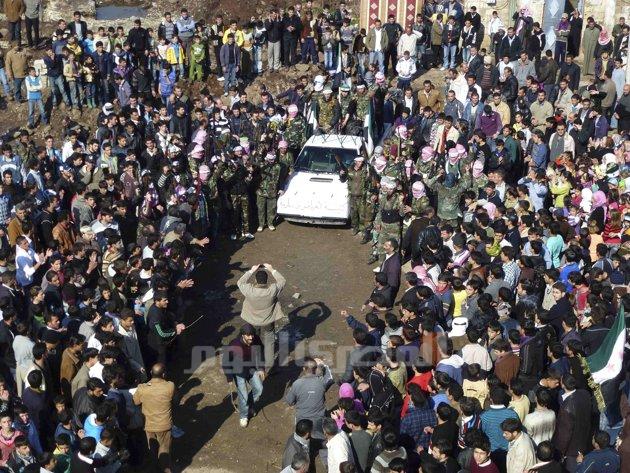
BEIRUT — Rebel fighters fled the eastern Syrian city of Deir al-Zor on Tuesday in the face of a fierce army assault, as Russia issued its toughest criticism yet of President Bashar al-Assad's handling of the year-long revolt.
The flight from the remote desert city, which lies on the road to Iraq, marked the latest setback for the armed opposition, which also faced accusations of torture and brutality from a leading human rights body.
However, just as he was making advances on the ground, Assad also appeared to suffer a setback on the diplomatic front, with key-ally Moscow adopting a new, sharper tone after months of publicly standing by his government.
"We believe the Syrian leadership reacted wrongly to the first appearance of peaceful protests and … is making very many mistakes," Foreign Minister Sergei Lavrov told Russian radio station Kommersant-FM.
"This, unfortunately, has in many ways led the conflict to reach such a severe stage."
Lavrov also spoke of a "future transition" period for Syria but continued to reject calls from most Western and Arab states for Assad to resign, saying this was "unrealistic."
It was not immediately clear if the change in language would translate into a tangible difference in the way international powers, hitherto divided on Syria, might deal with the crisis.
The uprising started with non-violent demonstrations last March, but the situation deteriorated rapidly amid a ferocious army crackdown and there are now daily clashes between rebels and security forces around the country.
The United Nations says more than 8,000 people have been killed so far, but the toll is rising rapidly, with at least 31 men, women and children dying on Tuesday, the British-based Syrian Observatory for Human Rights reported.
The majority of the deaths, 21 in total, were in the central Homs province due to heavy army shelling. Government troops also pounded residential areas in the city of Hama and the town of Rastan, while a soldier died in a raid on a checkpoint in the south, opposition sources said.
Civil war fears
Lightly armed rebel forces have been forced into retreat across the country in recent weeks, with the army using heavy weapons to chase them from towns and cities, chalking up its latest victory in Deir al-Zor.
"Tanks entered residential neighborhoods, especially in southeastern areas of Deir al-Zor. The Free Syrian Army pulled out to avoid a civilian massacre," a statement by the Deir al-Zor Revolution Committees Union said.
After failing to hold significant stretches of land, analysts say the rebels appear to be switching to insurgency tactics, pointing to bloody car bomb attacks in two major Syrian cities at the weekend and the sabotage of a major rail link.
Diplomats warn the fighting could develop into a civil war pitching Assad's Alawite sect and its minority allies against the majority Sunni Muslim population.
The government says 2,000 members of the security forces have been killed by foreign-backed "terrorists" and denies accusations of brutality and indiscriminate violence.
In a new twist, the advocacy group Human Rights Watch said the rebels were guilty of serious crimes, citing cases of kidnapping, torture and cold-blooded killings.
"The Syrian government's brutal tactics cannot justify abuses by armed opposition groups," said Sarah Leah Whitson, Middle East director at the New York-based Human Rights Watch, in an open letter to dissident groups.
Washington said it would "absolutely denounce" human rights violations by the rebels, but stressed that most of the abuse was being carried out by pro-Assad forces.
Russian conditions
Russia has previously vetoed two Western and Arab-backed UN resolutions condemning government violence, arguing that the actions of rebels should also be criticized.
In a fresh effort to form a united international front, France has circulated a Western-drafted statement for the UN. Security Council deploring the turmoil and backing peace efforts by UN-Arab League envoy Kofi Annan.
Russia announced it would back the text on two conditions – that there was no ultimatum imposed on Assad and that Annan release full details of his peace plan.
Annan dispatched a team of five experts to Damascus on Monday to discuss ways of implementing the peace drive, including a mechanism to let international monitors into the country. Syria has questioned the value of such a mission and talks continue.
Lavrov also dismissed media reports of Russian warships entering Russia's naval facility in the Syrian port of Tartous as "fairy tales." Some reports had said Russian ships were delivering weapons or special forces troops.
Lavrov said a Russian tanker with fuel for Russian warships involved in anti-piracy operations in the Gulf of Aden was docked at the port. Russia has repeatedly said its arms sales to Syria violate no laws and it sees no grounds to suspend them.
The Free Syria Army, a disparate group of fighters led by army deserters, has proved little match for Assad's well-armed security apparatus, and experts said the opposition appeared to be changing tactics.
Car bomb attacks in the capital Damascus and second city Aleppo killed at least 30 over the weekend, while rebels also destroyed a railway bridge linking Damascus to Deraa, according to official Syrian media.
"The Syrian opposition prematurely tried to hold territory and take on the Syrian Army. This was a bad and costly mistake," said Joshua Landis, the head of Middle East Studies at the US University of Oklahoma.
"In the new phase of the battle that is shaping up to combat the Assad regime, opposition leaders are likely to champion new tactics of militancy and Islamization," he wrote on his blog Syria Comment.




